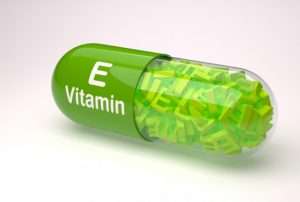Benefits Of Vitamin E capsules: Uses, Dosage & More

Vitamin E is necessary for the human body to operate normally. It is a critical component of your immune system and acts as an antioxidant, eliminating free radicals that cause genetic harm to cells. Unlike vitamin C, vitamin E is fat-soluble, allowing it to be stored in the liver and fatty tissues of the body. Vegetable oils, eggs, meat, poultry, grains, fruits, and vegetables contain vitamin E.
While a balanced diet often provides enough vitamin E, there are instances when a vitamin E supplement may help treat or prevent certain conditions. Vitamin E deficiency is uncommon in the industrialised world, save in preterm infants with low birth weight and in individuals with rare hereditary illnesses such as abetalipoproteinemia or ataxia with vitamin E insufficiency. You may also develop a deficit if you have a malabsorption problem such as Crohn’s disease or ulcerative colitis, which causes vitamin E to be absorbed less efficiently in the intestines.
Vitamin E is one of several nutrients referred to as an essential nutrient since it cannot be produced by the body and must be received from diet or supplements.
Benefits of vitamin e capsules
1. Vitamin E Strengthens Physical Endurance
The benefits of vitamin e capsules assist in increasing your body’s energy levels, reducing the damage caused by exercise, and improving muscular strength. According to an article in Sports Medicine, Vitamin E supplementation can help reduce exercise-induced oxidative damage and maximise the health advantages of workouts.
2. Vitamin E Defends Against Movement Disorders
Ataxia is a hereditary mobility condition that results in severe vitamin E deficiency. According to the Cochrane Database of Systematic Reviews, Vitamin E can be used to treat persons with persistent mental illness, including movement difficulties.
3. Vitamin E Could Help Prevent Cancer
Vitamin E is utilized to prevent cancer in various organs throughout the body, including the lung, oral, colorectal, and stomach. According to Andrea S. Blevins Primeau, PhD and MBA, multiple controlled experiments have demonstrated that vitamin E supplementation has been proved to reduce cancer incidence.
4. Vitamin E Treats Disorders Of The Brain And Nervous System
Vitamin E aids in the treatment of brain and nervous system illnesses such as Alzheimer’s and other dementias. According to the journal Nutrients, Vitamin E functions as an antioxidant, protecting cells from the damage caused by oxidative stress and decreasing the risk of developing brain and nerve illnesses.
5. Vitamin E Decreases Diabetes
Vitamin E is frequently used to treat Diabetes and associated symptoms while restoring normal blood sugar levels. Vitamin E is primarily used to prevent type 2 diabetes by improving glycemic control, according to the Women’s Health Study.
6. Vitamin E Capsule Contributes to Eye Health
Vitamin E aids in the secretion of substances that preserve the health of your eyes and help avoid a variety of eye problems, including cataracts. According to Gary Heiting, OD, Vitamin E supplementation may help prevent the progression of age-related macular degeneration (AMD) in patients who have early indicators of eye illness.
7. Vitamin E Manages the Disorders of the Skin
Vitamin E is extensively advertised as an “anti-ageing” component by cosmetic producers. The majority of existing research indicates that such statements are exaggerated.
Meanwhile, other researchers think that there are benefits of vitamin e capsules for the face. It helps in scar healing by moisturising the skin, decreasing collagen formation, and lowering inflammation that might result in tissue damage.
A 1999 research published in Dermatologic Surgery disproved these claims, concluding that vitamin E had no effect on scar appearance. Additionally, 33% of those who used it had contact dermatitis, an allergic skin reaction.
Also Read: Other forms of Vitamins
What is the best way to consume vitamin E?
Follow the directions on the label or your doctor’s instructions when using vitamin E supplements. Do not exceed the prescribed dose or duration of usage.
Vitamin E is most effective when taken with meals. Measure liquid medication using the accompanying dosage syringe or a dose-measuring spoon or medicine cup. If you do not have dose-measuring equipment, you may obtain one from your pharmacist.
Phenylalanine may be included in artificially sweetened liquid medications. If you have phenylketonuria, check the medicine label (PKU). Vitamin E’s recommended dietary intake rises with age. Adhere to your physician’s directions. Additionally, you may reference the National Institutes of Health’s Office of Dietary Supplements or the United States Department of Agriculture’s (USDA) Nutrient Database (previously “Recommended Daily Allowances”) listings for additional information.
If you require surgery or medical treatment, inform the surgeon in advance that you are taking vitamin E. You may need to temporarily discontinue using the medication. Keep dry and away from moisture and heat.
References
1. Maret Traber & Danny Manor, May 2012, https://www.researchgate.net/publication/224958595_Vitamin_E
2. Volker Bohm, May 2018, https://www.researchgate.net/publication/323889351_Vitamin_E
3. Saliha Rizvi, Syed T. Raza, Faizal Ahmed, Absar Ahmad, Shania Abbas, & Farzana Mahdi, April 2017, https://www.ncbi.nlm.nih.gov/pmc/articles/PMC3997530/














